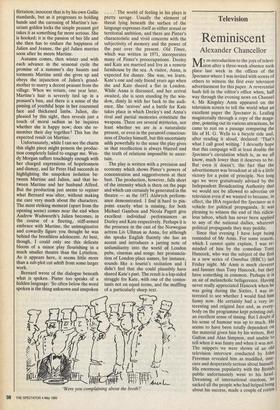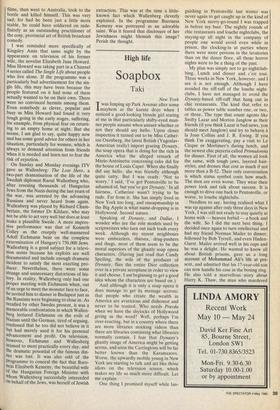Television
Reminiscent
Alexander Chancellor
My re-introduction to the joys of televi- sion after a three-week absence took place last week in the offices of the Spectator where I was invited with scores of others to witness the first ever television advertisement for this paper. A reverential hush fell in the editor's office when, half way through the evening news on Channel 4, Mr Kingsley Amis appeared on the television screen to tell the world what an excellent paper the Spectator is. Leafing magisterially through a copy of the maga- zine, pointing out its various attractions, he came to rest on a passage comparing the life of H. G. Wells to a bicycle ride and, after reading it aloud, declared: 'That's what I call good writing.' I devoutly hope that this campaign will at least double the Spectator's circulation which is, as we all know, much lower than it deserves to be. But even it doesn't, the fact that the advertisement was broadcast at all is a little victory for a point of principle. Not long ago we were gratuitously advised by the Independent Broadcasting Authority that we would not be allowed to advertise on television even if we wanted to because, in effect, the IBA regarded the Spectator as a vehicle for political propaganda. It was pleasing to witness the end of this ridicu- lous taboo, which has never been applied to any of the national dailies, whatever political propaganda they may peddle.
Since that evening I have kept being reminded of Mr Amis. For some reason, which I cannot quite explain, I was re- minded of him by the comedian Tony Hancock, who was the subject of the first in a new series of Omnibus (BBC1) last Friday night. Mr Amis is much cleverer and funnier than Tony Hancock, but they have something in common. Perhaps it Is an air of melancholic belligerence. Having never really appreciated Hancock when he was going during the Sixties, I was in- terested to see whether I would find him funny now. He certainly had a very in- teresting and original face and, as every- body on the programme kept pointing out, an excellent sense of timing. But I doubt if his sense of humour was up to much. He seems to have been totally dependent on the material given him by his writers, Ray Galton and Alan Simpson, and unable to tell when it was funny and when it was not. The snippets we were shown of an old television interview conducted by John Freeman revealed him as muddled, inse- cure and desperately serious about himself. His enormous popularity with the British public unfortunately went to his head. Dreaming of international stardom, he sacked all the people who had helped bring about his success, made a couple of rotten
films, then went to Australia, took to the bottle and killed himself. This was very sad; for had he been just a little more stable, he could have soldiered on inde- finitely as an outstanding practitioner of the cosy, provincial art of British broadcast comedy.
I was reminded more specifically of Kingsley Amis that same night by the appearance on television of his former wife, the novelist Elizabeth Jane Howard. Miss Howard was taking part in a Channel 4 series called The Single Life about people who live alone. If the programme was a particularly bad advertisement for the sin- gle life, this may have been because the people featured on it had none of them actually wanted to be on their own. There were no convinced hermits among them. Even somebody as clever, popular and busy as Miss Howard had found it very tough going in the early stages, suffering, for example, from physical fear on return- ing to an empty home at night. But she seems, I am glad to say, quite happy now and has some good advice for others in her situation, particularly for women, which is always to demand attention from friends when it is needed and learn not to fear the risk of rejection.
On Sunday and Monday evenings ITV gave us Wallenberg: The Lost Hero, a two-part dramatisation of the life of the Swedish diplomat Raoul Wallenberg who, after rescuing thousands of Hungarian Jews from the Nazis during the last years of the war, was arrested by the advancing Russians and never heard from again. Wallenberg was played by Richard Cham- berlain, the former Dr Kildare, who may not be able to act very well but does at least make a plausible Swede. A more impres- sive performance was that of Kenneth Colley as the creepily well-mannered Adolf Eichmann bent on the complete extermination of Hungary's 750,000 Jews. Wallenberg is a good subject for a televi- sion series because his exploits are well documented and include enough dramatic Incident to satisfy the most exacting pro- ducer. Nevertheless, there were some strange and unnecessary distortions of his- tory. In reality, Wallenberg only had one Proper meeting with Eichmann when, out of an urge to meet the monster face to face, he invited him to dinner in Budapest just as the Russians were beginning to close in. As recalled by other Swedes present, it was a Memorable confrontation in which Wallen- berg lectured Eichmann on the evils of Nazism until the German, tired of arguing, Confessed that he too did not believe in it but had merely used it for his personal advancement and profit. On television, however, Eichmann and Wallenberg seemed to meet practically every day, and the dramatic potential of the famous din- ner was lost. It was also odd of the Programme to conceal the fact that Baro- ness Elizabeth Kemeny, the beautiful wife Of the Hungarian Foreign Minister with Whom Wallenberg successfully interceded O n behalf of the Jews, was herself of Jewish
extraction. This was at the time a little- known fact which Wallenberg cleverly exploited. In the programme Baroness Kemeny was portrayed as an adorable saint. Was it feared that disclosure of her Jewishness might blemish this image? Perish the thought.



















































 Previous page
Previous page